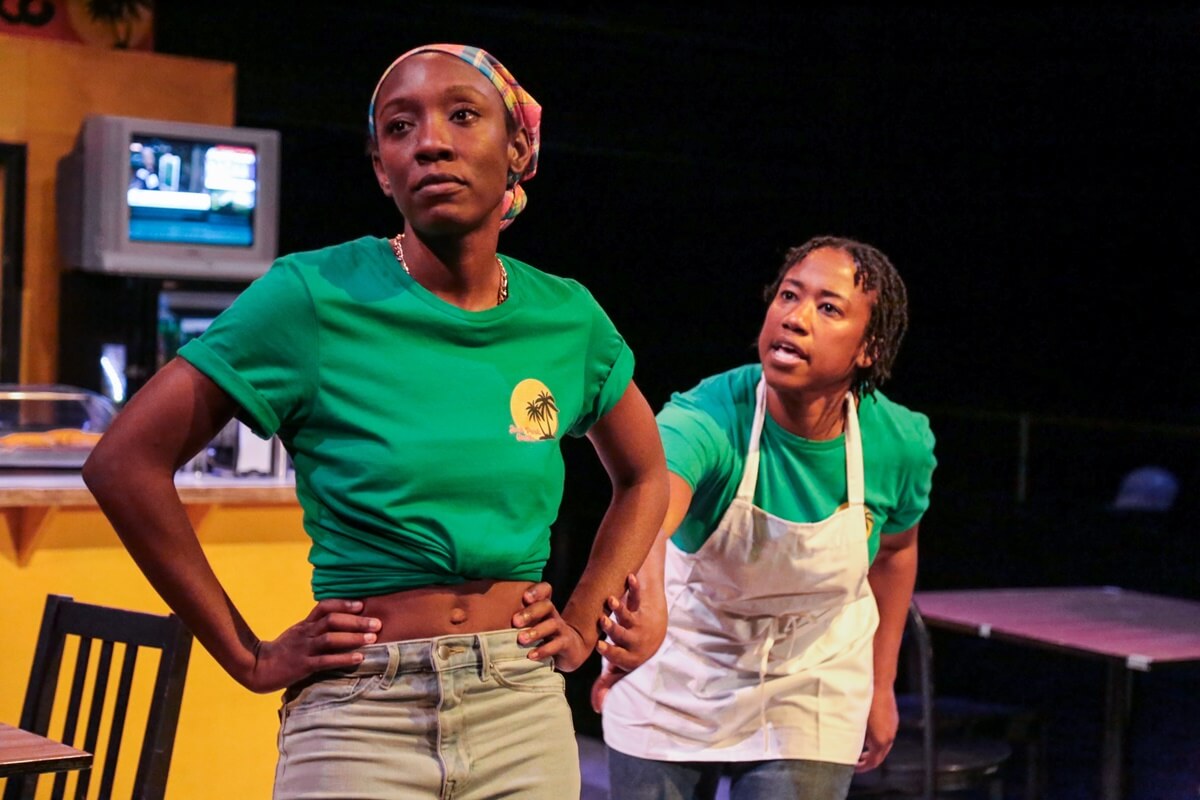
Theatre Passe Muraille & Cahoots Theatre/Our Place, written by Kanika Ambrose, directed by Sabryn Rock, Theatre Passe Muraille Mainspace, Nov. 18 to Dec. 3. Tickets available here.
Kanika Ambrose’s new play Our Place is a kick up the evolutionary scale of Canadian theatre. By that, I mean absolutely ground-breaking.
Our Place gives no quarter to the audience. Ambrose has written the dialogue in the thick patois of the Caribbean, and the stream of language is relentless. She has also placed her action in real life. We are hearing it, and seeing it, and feeling it. The play is théâtre verité at the extreme, and can almost be classed as docudrama.
A word of warning: I was lucky enough to be sitting where I could see the captions of the text. Usually, when there is a heavy accent involved, my ear becomes used to it and over time, meaning grows easier. That is not, however, what happens in this play. Thus, I urge the audience, (and Our Place is an absolute must-see), to request a ticket where you can view the captions if you are not familiar with West Indian dialect.
The scene is the Jerk Pork Castle, one of the many Caribbean fast food places on Kingston Rd. in Scarborough. Andrea (Virgilia Griffith) and Niesha (Sophia Walker) are working a shift together. One gathers that Andrea has stayed in Canada after her work visa has run out, and so is now undocumented, while Niesha is close to the end of hers.
Niesha is obsessed by the TV news that Canada is accepting 25,000 Syrian refugees who come off the plane into welcoming arms. They are given places to stay, jobs, and a track to Canadian citizenship. The fate that awaits undocumented female workers is deportation, unless they can find a man to marry them. The bottom line is that the government must believe that the marriage is a real one, and not a setup.
Both Andrea and Niesha have kind words for their never-seen employer, Yvonne. On one hand, Yvonne is taking a big risk on hiring them; on the other, however, it is pure exploitation. The women are earning $10 an hour and working extra-long shifts, while their legal co-workers get minimum wage and normal hours. Both women have left children behind in the islands whom they are supporting (and one does wonder where the fathers are).
As the play progresses, we learn about the men in their lives. Andrea is trying to land Malcolm (Tremaine Nelson), hoping he will commit to a long-term relationship. While Niesha has mixed feelings about what to do about Eldrick (Pablo Ogunlesi). One of the tensions that Ambrose builds into the script is that the audience is waiting for one or both of the guys to turn out to be a rotter.
Andrea and Niesha are lives lived on the edge. The risk factor is a palpable thing to them, and any reversal of fortune is another mountain to climb. For example, even finding a new place to live is fraught with danger. Ambrose’s text is so intense, so searing and so realistic, that we actually feel their pain.
Griffith and Walker are two of the best Black actors in Canada. They can play anything, from lofty Shakespeare and the classics, to the West Indian immigrants of Ambrose’s play, and everything in between. Their vibrant portrayals of Andrea and Niesha lift Ambrose’s troubled characters off the page.
Sex is the tool that is Andrea’s modus operandi, and she spends what money she has on cheap wigs, makeup and slinky clothes at Dollarama and Walmart. Her character is not afraid to mouth off her opinions and hurl insults and sarcasm with ease. But as Griffith plays her and Ambrose has written her, Andrea’s bravado hides a very vulnerable woman whose inner angst is heartbreaking. It is a stunning performance.

Niesha, on the other hand, is older and more cautious. In fact, she is always warning Andrea to be more careful, so when she, herself, contemplates jumping from the frying pan into the fire, the inherent fear and suspicions that come with the risks make her very, very angry. Walker’s arc, from even-tempered observer to a nerve wracked shrew, is magnificently executed.
The men in the play are the catalysts of change for the woman, and they couldn’t be more different.
Tremaine Nelson, making his first stage appearance after credits in TV and movies, turns in a polished performance as the sleek and slippery Malcolm. Pablo Ogunlesi as Eldrick is more approachable, and seemingly kinder and caring, and it is to the actor’s credit (and Ambrose’s script) that we are not sure just what is his truth.
Sim Suzer’s clever set has the audience on three sides, while incorporating the architecture of TPM into her design. She manages to fit in a realistic strip mall take-out joint, replete with counter and seating area. There is also a bedroom. Her costumes are wonderfully character defining. Shawn Henry has provided the pin-spot lighting, while designer NON’s soundtrack has the lilt of the islands.
Director Sabryn Rock is an impressive new talent, particularly in the way she manoeuvres her actors around the set. For example, the surrounding perimeters of the jerk joint are used as walkways, and the bedroom platform stairs is a car. At one point, Rock even employs the TPM balcony. She also makes deft use of the accoutrements of the Jerk Pork Castle to keep her workers busy with tasks. Her pacing is fast and furious, with excellent character line delivery.
Everything about Rock’s vision for the play runs deep, and we are right there on Kingston Rd. with Andrea and Niesha. At the end of the play, the multi-meaning title, Our Place, has become the saddest two words in the English language.
In her program notes, Ambrose points out that the West Indian jealousy towards the Syrians troubled her, even making her ashamed, but upon further investigation, she realized that the workers’ challenging situations were the fault of a broken immigration system.
And so the motivation, one presumes, for writing Our Place, was to expose the struggle for survival facing these workers, both undocumented and not, and the production is not for the faint of heart. Disturbing, unsettling are words that seem inadequate in describing the impact of this play.
I can add two more words I don’t think I have ever used in a review before to describe how I felt at the end of Our Place. Guilt and helplessness.
#LUDWIGVAN
Get the daily arts news straight to your inbox.
Sign up for the Ludwig van Daily — classical music and opera in five minutes or less HERE.
- SCRUTINY | Opera In Concert Shine A Light On Verdi’s Seldom Heard La Battaglia Di Legnano - April 9, 2024
- SCRUTINY | Lepage & Côté’s Hamlet Dazzles With Dance And Stagecraft Without Saying Anything New - April 5, 2024
- SCRUTINY | Canadian Stage’s The Inheritance Is A Monumental Theatrical Experience - April 3, 2024



